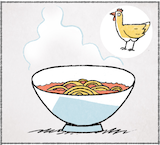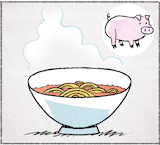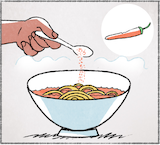


นี้คืออี่หยัง นี้คือกวยเตียว
กวยเตียวอี่หยัง กวยเตียวไก่
กวยเตียวไก่มีจักถ้วย กวยเตียวมีถ้วยเดียว
กวยเตียวถ้วยใหญ่บ่ บ่ กวยเตียวถ้วยบ่ใหญ่ กวยเตียวถ้วยพอดี
ในถ้วยมีกวยเตียวไก่หลายบ่ มีหลายอยู่ มีเกียบเต็มถ้วย
10
นี้คืออี่หยัง นี้คือกวยเตียว
กวยเตียวอี่หยัง กวยเตียวหมู
กวยเตียวหมูกับกวยเตียวไก่มันต่างกันบ่ กะต่างกันอยู่ แต่บ่ต่างกันหลาย กวยเตียวไก่กะสิใส่ไก่ กวยเตียวหมูกะสิใส่หมู
11
เขากำลังเฮ็ดหญัง เขากำลังปุงกวยเตียว
เป็นหญังเขาคือปุงกวยเตียว เขาอาดสิกินลดซาดที่เขาอยากกินกะได้
เขาใส่อี่หยังลงไปในกวยเตียว ตอนนี้เขาใส่บักพิกลงไปในกวยเตียว
เป็นหญังเขาคือใส่บักพิกลงไปในกวยเตียว เขาอาดสิกินเผ็ดๆ เขากะเลยใส่บักพิกลงไปในกวยเตียวกะได้
เขาใซ้อี่หยังตักบักพิก เขาใซ้ซ้อนตักบักพิกแล้ว[เอา]มาใส่ในถ้วยกวยเตียว
เขาใส่บักพิกหลายบ่ บ่ลู้คือกันว่าเขาใส่บักพิกหลายบ่ อาดสิใส่หลายกะได้
Link to overview page
Link to dictionary
| Isaan | Pronunciation | Tones | Thai | English/Notes |
|---|---|---|---|---|
| นี้ | ni: | HF | นี้ | 1. this 2. here |
| คือ | khʉ: | HR | คือ | 1. to be, to resemble, like, as 2. why {บักหล้าคือบ่เก็บโต่ะแน่ = [addressing a young boy] Why haven't you cleared the table?} |
| อี่หยัง | i:-yaŋ | H-M | อะไร | 1. what {นี้คืออี่หยัง = What is this?} {มื้อนี้เจ้าเฮ็ดอี่หยัง = What are you doing today?} {กินเข้างายกับอี่หยัง = What did you have for breakfast?} 2. something, anything, (in negations) nothing {บ่ต้องเฮ็ดอี่หยังอีกเลยนอกจากใส่ปุย = [we] don't need to do anything besides adding fertilizer} |
| กวยเตียว | gu:ai-ti:ao | M-M | ก๋วยเตี๋ยว | kind of noodle soup Notes: pronunciation: often with rising tones, especially in isolation |
| ไก่ | gai | H | ไก่ | chicken |
| มี | mi: | HR | มี | 1. to have 2. there is |
| จัก | jak | M | จัก | 1. answer to a question: [I] don't know, don't know exactly, [I'm] not sure {พุซายคนนี้เขาเถ้าไป่ จัก จักเถ้าหลือบ่เถ้า เบิ่งบ่ค่อยออก = Is this man here already old? I don't know. I can't see clearly whether he's old or not.} {เขาเว้ากันอยู่ใส จักคือกัน = Where are they talking? I don't know either.} 2. exact(ly), what exactly {จักต้มอี่หยังกะบ่ฮู้ = I don't know what (exactly) he is cooking} {บ่ลู้คือกันจักปาอี่หยัง = I don't know either what kind of fish this is} 3. how much/many? {ต้นไม้มีจักต้น = How many trees are there?} {ตอนนี้จักโมงแล้ว = What time is it now?} {มือของเฮานี้สิมีจักนิ้ว = How many fingers do our hands have?} 4. a bit, a little bit {จักหน่อย/จักหน่อยหนึ่ง = a bit, a little bit} |
| ถ้วย | thu:ai | LF | ถ้วย | small bowl |
| เดียว | di:ao | M | เดียว | only, alone, single |
| ใหญ่ | ɲai | H | ใหญ่ | large, big |
| บ่ | bɔ: | H | ไม่ | 1. no, not 2. question particle, transforming a statement into a question Notes: spelling exception in line with common usage on social media |
| พอดี | phɔ:-di: | HR-M | พอดี | 1. to fit well 2. appropriate, just enough, just right {กะจกบานบ่ใหญ่ กะจกบานพอดี = not a large window, just right} {พอดีมือของเฮา = just right for his hand} 3. just in time, at the right moment, just this moment {แล้วพุซายคนนี้กะญ่างมาพอดี = and the man has come just now} |
| ใน | nai | HR | ใน | in, within |
| หลาย | la:i | M | เยอะ, มาก | many, much, very |
| อยู่ | yu: | H | อยู่ | 1. to be (located) at 2. yet, still 3. auxiliary indicating continuous or progressive action {ทอดปาอยู่ในกะทะ = (in the process of) frying a fish in the pan} {แม่กำลังเมี้ยนเฮียนอยู่ = mother is cleaning/tidying up the house} |
| เกียบ | gi:ap | LF | เกือบ | nearly, almost |
| เต็ม | tem | M | เต็ม | full |
| หมู | mu: | M | หมู | pig |
| กับ | gap | M | กับ | 1. and {ลุงกับป้า = uncle and aunt} {กวยเตียวหมูกับกวยเตียวไก่ = noodle soup with pork and noodle soup with chicken} 2. with, to {ค้ายๆ กับคำว่า ... = similar to the word ...} 3. prefix in front of foods {กับเข้า = side dishes eaten with rice} {เขากินกับกวยเตียว = he's eating noodle soup} |
| มัน | man | HR | มัน | it (also used to refer to people) |
| ต่าง | ta:ŋ | H | ต่าง | 1. to differ 2. foreign |
| กัน | gan | M | กัน | mutual, each other, with another, together {เขากำลังนั่งเว้ากัน = they're sitting and talking} {เขาสองคนฮักกัน = they love each other} {ปาสองโตนี้ ใหญ่ห่างกันหลายบ่ = These two fish here, are they very different in size (from each other)?} {ต่างกัน = to be different (from each other)} {ก่องอันไหนหนักกว่ากัน = Which box is heavier (than the other(s))?} |
| กะ | ga | M | ก็ | 1. then, consequently 2. also |
| แต่ | tɛ: | H | แต่ | 1. but {แต่บ่ต่างกันหลาย = but not very different} {แต่บ่ลู้ว่าเขาญ่างมาแต่ใส = but [I] don't know where he's coming from, see also: แต่ว่า} 2. only {ตอนนี้มีแต่ขี้ฝ้า = now there are only clouds} |
| สิ | si | M | จะ | future tense auxiliary {เขากำลังสิตื่น = he's about to wake up} {สิไปตะหลาด = [I'm] going to the market} |
| ใส่ | sai | H | ใส่ | 1. to put something in/on {เขาใส่บักพิกในกวยเตียวหลาย = he's putting a lot of chili in his noodle soup} {เขาบีบยาสีฟันใส่แปงสีฟัน = he squeezes toothpaste on the toothbrush} {ก่องเอาไว้ใส่ของ = boxes are there to put stuff in} 2. to wear (clothes) {เขาใส่เสี้ยแขนญาว = he's wearing a long-sleeve} 3. directed at {เอิ้นใส่กัน = to call each other/to say to each other} {หมามันเห่าใส่แมว = the dog barks at the cat} {ล้องเพงใส่ไม = to sing into the microphone} {เขากำลังซี้มือไปใส่พุซาย = she's pointing at the man} |
| เขา | khao | M | เขา | personal pronoun: he, she |
| กำลัง | gam-laŋ | M-HR | กำลัง | auxiliary indicating continuous or progressive action |
| เฮ็ด | het | H | ทำ | to do, to make |
| หญัง | ɲaŋ | M | อะไร, เป็นหญัง = ทำไม | 1. what {เขากำลังเฮ็ดหญัง = What is he doing?} {ธูปเอาไว้เฮ็ดหญัง = What are incense sticks for?} 2. something, anything, (nothing) 3. เป็นหญัง[...]คือ in initial position: why {เป็นหญังเขาคือใส่บักพิกลงไปในกวยเตียว = Why is he putting chili in [his] noodle soup?} {เป็นหญังหน้าต่างมันคือเปิด = Why is the window open?} {เป็นหญังมันคือมีควนไฟ = Why is there smoke?} |
| ปุง | puŋ | M | ปรุง | to season, to flavor, to cook, to mix, to combine {ปุงกาแฟ = to season coffee, i.e., to add sugar} {ปุงกวยเตียว = to season noodle soup (e.g., with chili, fish sauce, vinegar, sugar etc.)} |
| เป็น | pen | M | เป็น | 1. to be, to exist 2. to be able to 3. to suffer, sth. happens to 4. เป็นหญัง[...]คือ in initial position: why? {เป็นหญังเขากะคือแปงฟัน = Why is he brushing his teeth?} {เป็นหญังเคี่ยงบินมันคือสิตก = Why is the airplane falling down?} |
| อาด | a:t | LF | อาจ | 1. might, may, will 2. likely |
| กิน | gin | M | กิน | to eat, to consume, to use |
| ลดซาด | lot-sa:t | H-HF | รสชาติ | taste Notes: pronunciation: also realized as ลดชาด |
| ที่ | thi: | H | ที่ | 1. that, which {คนที่ยืนอยู่ฝั่งขวา = the person which is standing on the right = the person standing on the right} {เว้าคำที่บ่สุพาบ = to speak words which are impolite = to speak impolitely} 2. for ordinal numbers {ที่สาม = third} |
| อยาก | ya:k | LF | อยาก | to want, to wish |
| ได้ | dai | HF | ได้ | 1. can 2. to get, to obtain 3. before verb: indicating past tense 4. บ่ได้ + verb: not |
| ลง | loŋ | HR | ลง | 1. to descend, to lower, to go down 2. down 3. bus/train etc.: to get off, to disembark {คนกำลังลงลดบั่ด = people are getting off the bus} 4. boat/ship etc.: to get on, to board {เขากำลังญ่างลงเลีย = he's boarding/getting on the boat} |
| ไป | pai | M | ไป | 1. to go 2. auxiliary indicating action extending into the future |
| ตอนนี้ | tɔ:n-ni: | M-HF | ตอนนี้ | now |
| บักพิก | bak-phik | M-H | พริก | chili |
| เผ็ด | phet | M | เผ็ด | spicy, hot |
| เลย | lə:i | HR | เลย | 1. futher on, beyond, past {เข็มน้อยเลยเลขสิบสองไป = the minute hand has passed number twelve} 2. too much 3. at all 4. definitively 5. completely, utterly |
| ใซ้ | sai | HF | ใช้ | to use |
| ตัก | tak | M | ตัก | 1. to scoop {ตักน้ำ = to scoop water} 2. to shovel/dig {เอาพั้วตักดิน = to dig with a spade} |
| ซ้อน | sɔ:n | HF | ช้อน | spoon {เขาใซ้ซ้อนคนกาแฟ = he's stirring the coffee with a spoon} |
| แล้ว | lɛ:o | HF | แล้ว | 1. finished 2. already 3. and then, and next (especially แล้วกะ) 4. auxiliary for past tense |
| เอา | ao | M | เอา | to take, to give {เขากำลังเอาก่องไปซั่ง = he's taking the boxes to weigh them} {หมอกำลังเอายาให้คนป่วยกิน = the doctor is giving medicine to the patient} {เอาไว้ถ้า = is for, is used for, has the purpose of} |
| มา | ma: | HR | มา | 1. to come 2. auxiliary expressing action towards the present or focal time {กะคุเฮ็ดมาจากอี่หยัง = What is the bucket made of?} {แล้วเขากะเก็บเงินจากพุนั้นมา = and then she takes the money of that person} |
| ลู้ | lu: | HF | รู้ | 1. to know 2. to understand Notes: equivalent to ฮู้ |
| คือกัน | khʉ:-gan | HR-M | เหมือนกัน | 1. also, likewise, similarly {ยินดีที่ได้ฮู้จักคือกันคับ = Nice to meet you too!} 2. in negative sentences: either {บ่ลู้คือกัน = I don't know either} {จักคือกัน = I don't know (either)} |
| ว่า | wa: | H | ว่า | 1. that, as {คำว่า X = the word X} 2. to say |